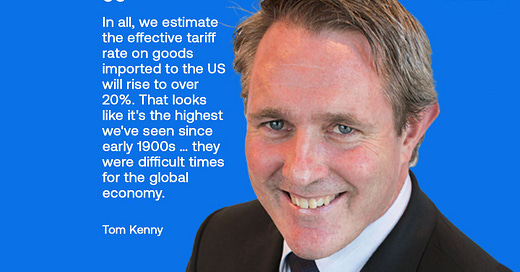US stocks, bond yields and the US dollar are down sharply after Donald Trump unveiled much higher than expected tariffs. Investors fear a US recession and higher inflation. Australia though may fare better, with gold exempted, and beef prices high.
In our bonus deep dive interview, I spoke with ANZ Senior International Economist Tom Kenny late last night about what would be an unprecedented rise in US tariffs to higher than levels seen after the Smoot Hawley Act of 1930.
5 things to know in 5 minutes:
US stocks slumped and investors piled into safe haven bonds overnight after Donald Trump unveiled much worse than expected tariffs. As of 4am Sydney/Melbourne time, the S&P 500 was down 4%, the Nasdaq was down 5% and oil prices were down 7%, also hammered by OPEC production increases. ANZ Head of G3 Economics Brian Martin says investors fear hits to growth and inflation.
US tariffs on imports from China are set to go up to an overall 54%. ANZ’s Chief Economist for Greater China, Raymond Yeung, says China’s own economic growth may not be hit too hard, at least initially, because its surplus with the United States makes up about 1.5% of its GDP, and China’s Government is stimulating consumer spending and production.
Raymond says the bigger problems for China will come from deflation as domestic producers use their surpluses not going to the United States to push prices lower domestically, and youth unemployment is high.
Australia was put on the lowest tier of 10%, with its second largest export, gold, exempted. ANZ Australia Economist Sophia Angala says Australia’s largest exports to the United States are beef, where demand globally is high.
Australia yesterday reported its lowest monthly trade surplus since August 2020, largely due to the reversal of gold being shifted to the United States ahead of the tariffs, says Sophia.
Cheers,
Bernard
PS: Catch you on Monday with more reaction to what would be the largest increase in US tariffs in history.














